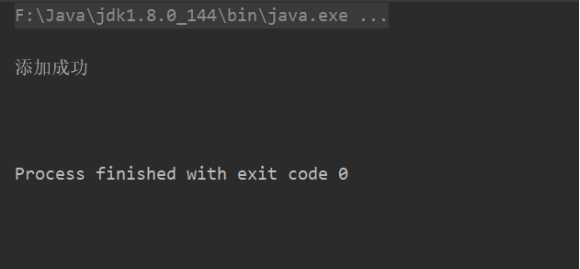使用注解方式实现 AOP和IoC
Posted 1314justin
tags:
篇首语:本文由小常识网(cha138.com)小编为大家整理,主要介绍了使用注解方式实现 AOP和IoC相关的知识,希望对你有一定的参考价值。
使用注解方式实现AOP和IoC
IOC和DI的注解
IOC:
@Component:实现Bean组件的定义
@Repository:用于标注DAO类,功能与@Component作用相当
@Service:用于标注业务类
@Controller:用于标注控制器
DI:
@Resource(name="userService")
默认ByName方式,如果name确实默认按照ByType方式注入
@Autowired
默认ByType方式,如果出现同名类,则不能按照Type进行注入
需要使用@Qualifier 指明ID
1. 使用注解实现IoC案例
1.1 编写applicationContext.xm文件
<!--扫描注解:包扫描器--> <context:component-scan base-package="cn.spring"/>
1.2创建mapper接口
public interface UserMapper { public int addUser(User user); }
1.3 创建mapper接口实现类
@Repository public class UserMapperImpl implements UserMapper { @Override public int addUser(User user) { System.out.println("添加成功"); return 1; } }
1.4创建Service接口
public interface UserService { public int addUser(User user); }
1.5创建Service接口实现类
@Service("userServiceImpl")
public class UserServiceImpl implements UserService {
//植入Dao层对象
//@Resource默认是根据byName的方式,但是一旦名字为空 ,就根据byType
@Autowired
private UserMapper userMapper;
@Override
public int addUser(User user) {
return userMapper.addUser(user);
}
}
1.6 编写测试类
@org.junit.Test public void test2() { ApplicationContext context = new ClassPathXmlApplicationContext("applicationContext.xml"); //通过类型调度 //UserInfoService userService=context.getBean(UserService.class); //指定@Service的value值后使用bean的id名称调度 UserService userServiceImpl = (UserService) context.getBean("userServiceImpl"); userServiceImpl.addUser(new User()); }
1.7 控制台

使用注解方式实现AOP
- 实现AOP的注解有
- @Aspect 声明切面
- @Ponitcut 声明公共的切点表达式
- @Before 前置增强
- @AfterReturning 后置增强
- @Around 环绕增强
- @AfterThrowing 异常抛出增强
- @After 最终增强
1.使用注解方式实现前置增强和后置增强
1.1 编写applicationContext.xml文件
<!--开启AOP注解支持--> <aop:aspectj-autoproxy/>
1.2 创建Service类
@Service("IDoSomeService")
public class IDoSomeService {
public void doSome(){
System.out.println("业务类中dosome方法");
}
public void say(){
System.out.println("业务类中say方法");
}
}
1.3 编写切面类实现增强
@Aspect @Component public class MyAdvice { @Pointcut("execution(* *..service.*.*(..))") public void point(){ } @Before("point()") public void before(){ System.out.println("前置增强"); } @AfterReturning("execution(* *..service.*.*(..))") public void afterReturning(){ System.out.println("后置增强"); } }
1.4 编写测试类
@org.junit.Test public void test3(){ ApplicationContext context=new ClassPathXmlApplicationContext("applicationContext.xml"); IDoSomeService iDoSomeService = (IDoSomeService)context.getBean("IDoSomeService"); iDoSomeService.doSome(); iDoSomeService.say(); }
1.5 控制台

2. 使用注解方式实现环绕增强
2.1 编写applicationContext.xml文件
<!--扫描注解:包扫描器--> <context:component-scan base-package="cn.spring"/> <!--开启AOP注解支持--> <aop:aspectj-autoproxy/>
2.2 创建Service类
@Service("IDoSomeService")
public class IDoSomeService {
public void doSome(){
System.out.println("业务类中dosome方法");
}
public void say(){
System.out.println("业务类中say方法");
}
}
2.3编写切面类实现增强
@Aspect @Component public class AroundAdvisor { @Around("execution(* *..service.*.*(..))") public void around(ProceedingJoinPoint PJ) throws Throwable { System.out.println("环绕增强"); PJ.proceed(); System.out.println("环绕增强"); } }
2.4编写测试类
@org.junit.Test public void test3(){ ApplicationContext context=new ClassPathXmlApplicationContext("applicationContext.xml"); IDoSomeService iDoSomeService = (IDoSomeService)context.getBean("IDoSomeService"); iDoSomeService.doSome(); iDoSomeService.say(); }
2.5控制台

3. 使用注解实现异常抛出增强
在exception包下完成对应的用例。
声明切面类
@Aspect public class AroundLoggerAnno { @Around("execution(* com.cmy.service.*.*(..))") public Object aroundLogger(ProceedingJoinPoint jp) throws Throwable { System.out.println("调用 " + jp.getTarget() + " 的 " + jp.getSignature().getName() + " 方法。方法入参:" + Arrays.toString(jp.getArgs())); try { Object result = jp.proceed(); System.out.println("调用 " + jp.getTarget() + " 的 " + jp.getSignature().getName() + " 方法。方法返回值:" + result); return result; } catch (Throwable e) { System.out.println(jp.getSignature().getName() + " 方法发生异常:" + e); throw e; } finally { System.out.println(jp.getSignature().getName() + " 方法结束执行。"); } }
创建Spring的核心配置文件,开启Spring对IOC和AOP注解的支持
新增app-08.xml文件
<!--开启Spring IOC的注解支持 base-package 包扫描语句 com.cmy包下的注解--> <context:component-scan base-package="com.cmy"/> <!--配置增强类 交给Spring容器管理--> <bean class="com.cmy.exception.ErrorLogger"></bean> <!--开启Spring AOP注解的支持--> <aop:aspectj-autoproxy />
编写测试用例,在DoSomeServiceImpl模拟异常
public class Demo2 { public static void main(String[] args) { //声明式增强 必须加载Spring容器 ApplicationContext app = new ClassPathXmlApplicationContext("com/cmy/exception/app-08.xml"); //获取代理对象 DoSomeService doSomeService=(DoSomeService)app.getBean("doSomeService"); doSomeService.say(); } }
4.使用注解实现最终增强
使用After包,增加切面类
/** * 通过注解实现最终增强 */ @Aspect public class AfterLoggerAnno { @After("execution(* com.cmy.service.*.*(..))") public void afterLogger(JoinPoint jp) { System.out.println(jp.getSignature().getName() + " 方法结束执行。"); } }
新建app-10.xml文件
<!--开启Spring IOC的注解支持 base-package 包扫描语句 com.cmy包下的注解--> <context:component-scan base-package="com.cmy"></context:component-scan> <!--配置增强类 交给Spring容器管理--> <bean class="com.cmy.after.AfterLoggerAnno"></bean> <!--开启Spring AOP注解的支持--> <aop:aspectj-autoproxy />
创建测试用例
public class Demo2 { public static void main(String[] args) { //声明式增强 必须加载Spring容器 ApplicationContext app = new ClassPathXmlApplicationContext("com/cmy/after/app-10.xml"); //获取代理对象 DoSomeService doSomeService=(DoSomeService)app.getBean("doSomeService"); doSomeService.say(); } }
以上是关于使用注解方式实现 AOP和IoC的主要内容,如果未能解决你的问题,请参考以下文章